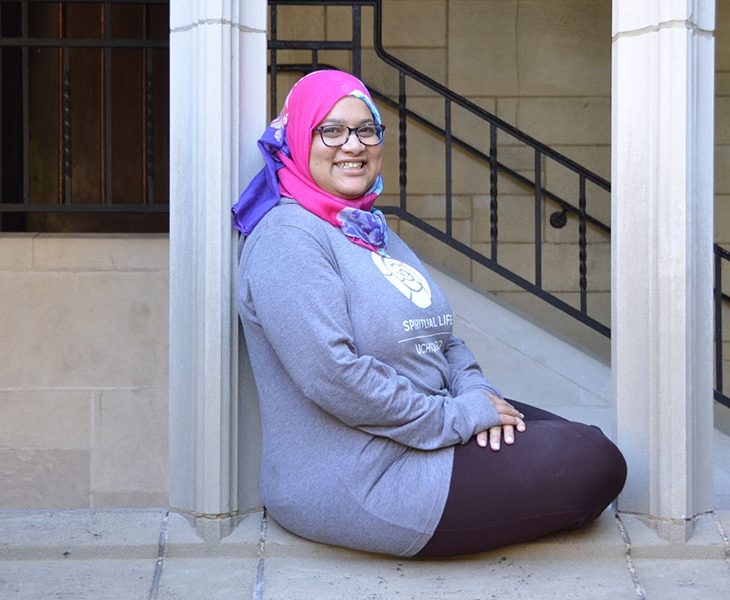Chaplaincy in a Time of Uncertainty
May 4, 2020

If I could describe the Covid-19 pandemic in one word, I would pick “uncertainty.” We receive new information about the number of cases, how the virus is spreading, how we should be acting and more on a daily basis, sometimes on an hourly basis, making it feel like I don’t have solid ground to stand on. Working in higher education, chaplains have been tasked with quickly finding new ways to support and serve our student, faculty and staff communities. While some of the work we are doing is converting our existing programming and resources to be accessible online, we are also rethinking about new needs and resources that are emerging among this pandemic. The biggest need we continually circle back to is connection.
As a chaplain, I am constantly trying to figure out what my role is and how I can best support my communities, friends and family. It can quickly become overwhelming, until I take a step back and remind myself of why I am doing this work. It is best described by author, Kerry Egan in her book, On Living:
“We’re story holders. We listen to the stories that people believe have shaped their lives… [A chaplain] might ask questions you would never have considered, or help you remember other times you survived something hard and other ways you made sense of what seemed senseless. She can reframe the story and can offer a different interpretation to consider, accept or reject. She can remind you of the larger story of your life or the wisdom of your faith tradition. She can hold open a space of prayer or meditation or reflection when you don’t have the energy or strength to keep the walls from collapsing.”
Stories are filled with so much history, emotion, relationships and meaning. I have the privilege of being invited into these sacred and mundane, joyous and sorrowful, clear and confusing moments of peoples’ lives. As they share their stories, I am given a glimpse into the bigger picture of the lives that sit across from me.
At the core of these stories are the relationships, the ones that I am hearing about and the one that I have with the storyteller. In these times of physical distancing, we are faced with the question of how we cultivate these relationships through technology. While there are amazing tools for us to continue these relationships and build communities, it’s not the same. We can grieve the loss of these physical connections, being together and the many other challenges that people are facing at this time, while at the same time remembering the stories of courage, resilience and hope. These are the stories that hold us together and as Egan describes, remind us of what’s within that hold us together in these times of uncertainty. The means of communication may change, but the stories remain.
These past few weeks my work has felt distant from these stories and relationships. Much of my time has been on the back end of our website developing new content, helping our team of religious advisors prepare to host virtual office hours and thinking of new ways to support students and staff in this unprecedented time. While much of it has been routine admin work, I am reminded that all of it is in efforts to create spaces for relationships to continue and stories to be told. We have developed a number of resources on our website for students to access at any time and live open office hours where students can come in and check in with one of our team members or have company while they work.
Many times, a check in with a student starts off casual, talking about the weather and how they are “adjusting to this life.” We talk about what they have been doing in the recent weeks and maybe something new they have tried. After a few more minutes, I start to hear a bit more of the challenge, grief, confusion and sadness they are feeling. I am hearing things like:
“It’s hard to concentrate on classes when I have been on the computer all day.” “I’m worried about my family in another state who are also taking care of elder family members. I decided not to go home because I don’t want to risk exposing my family.” “I am lonely at home and not sure who to turn to, I’m tired of being on Zoom calls.” “I’m upset about graduation being canceled. I feel like I am not getting the closure I wanted for this chapter of my life.”
All these feelings are natural, real and current. Even if they feel like they cannot exist simultaneously, I assure them. This is an unprecedented time; our whole lives have been turned upside down, and our bodies are in survival mode.
As Egan writes, we all have stories from our past that remind us of how we overcame challenges and of tools that may help us manage our present. It is okay to feel all of this, in fact it allows us to move through it and not sit stagnant within us. As I continue to find ways to connect with students and hear their stories, I want to remind them, and myself, that all of the stories we have, whether they feel big or small, are important in how we create the narrative of our lives.
Share
Related Articles
American Civic Life
How House Chaplain Calmed Tense Hours in Besieged Capitol with Prayers
Higher Education
Interfaith Inspiration
How Hospital Chaplains Can Help Patients — No Religion Required



